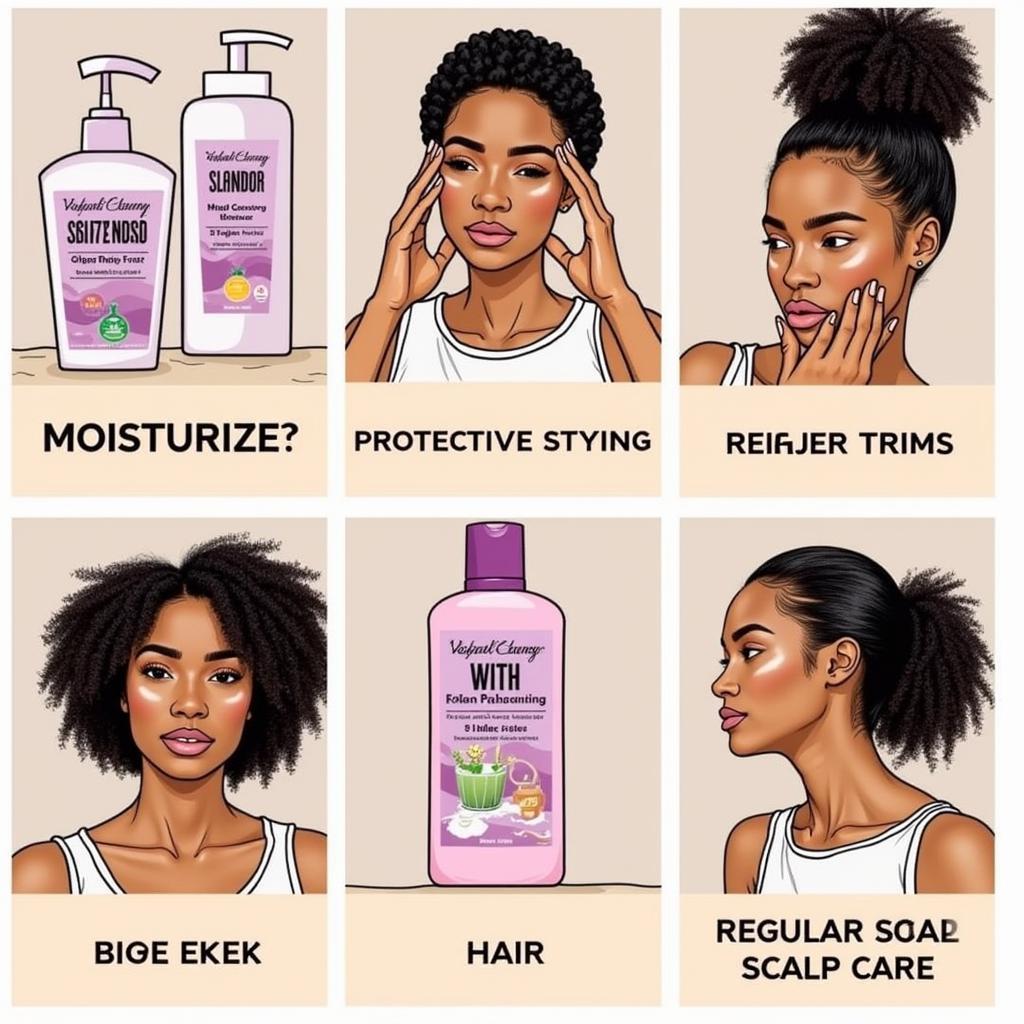African American Hair Growth Vitamins: Separating Fact from Fiction
Navigating the world of hair care can feel like traversing a jungle of products and promises. This is especially true for individuals with African American hair, who often find themselves bombarded with claims about “miracle” African American Hair Growth Vitamins. But how much of this is rooted in science, and how much is simply hype? This comprehensive guide delves into the truth about hair growth vitamins, exploring their potential benefits, limitations, and what you should consider before incorporating them into your hair care routine.
Understanding African American Hair: A Unique Composition
African American hair, characterized by its tightly coiled structure and naturally dry texture, requires a tailored approach to care. This unique hair type is prone to breakage, dryness, and slower growth rates due to its elliptical shape and the way the hair follicles curve beneath the scalp. This inherent fragility underscores the need for a holistic hair care regimen that addresses these specific needs.
The Role of Vitamins in Hair Growth
Hair, like every other part of our body, requires specific nutrients to thrive. Vitamins, essential micronutrients, play a crucial role in various cellular processes, including hair growth. Let’s break down some key vitamins commonly associated with healthy hair:
- Biotin (Vitamin B7): Often hailed as the “hair growth vitamin,” biotin aids in the production of keratin, a protein that forms the building blocks of hair, skin, and nails.
- Vitamin D: Research suggests a link between vitamin D deficiency and hair loss. Vitamin D may help create new hair follicles, the tiny pores from which new hair strands grow.
- Vitamin E: This powerful antioxidant protects hair from damage caused by free radicals, unstable molecules that can harm cells and contribute to hair aging.
- Vitamin C: Essential for collagen production, vitamin C strengthens hair shafts and prevents breakage, promoting healthier, more resilient hair.
Can Vitamins Really Accelerate African American Hair Growth?
While vitamins are undeniably important for overall hair health, it’s crucial to approach claims of accelerated growth with a healthy dose of skepticism. Here’s the reality:
- Existing Deficiencies: If you have a diagnosed vitamin deficiency, supplementing with the specific lacking vitamin may improve hair growth. However, this improvement typically means restoring hair growth to its normal rate, not exceeding it.
- No Miracle Cure: Vitamins are not a magic solution for hair loss or slow growth caused by underlying medical conditions, genetics, or hormonal imbalances.
- Individual Results: Hair growth is a complex process influenced by numerous factors. While some individuals may notice improvements after taking hair growth vitamins, others may not experience any significant changes.
African American Hair Growth Treatments: Exploring Your Options
While vitamins can play a supporting role in a holistic hair care regimen, several other african american hair growth treatments can effectively address specific concerns:
- Topical Treatments: Minoxidil, a topical medication, is FDA-approved for treating hair loss and promoting hair regrowth.
- Hair Oils and Butters: Rich in essential fatty acids and nutrients, natural oils like jojoba oil, castor oil, and shea butter can nourish the scalp, moisturize hair strands, and minimize breakage.
- Scalp Care: Maintaining a clean and healthy scalp is crucial for optimal hair growth. Regularly cleansing, exfoliating, and using a scalp massager can stimulate blood circulation and promote a favorable environment for hair follicles.
 Essential Hair Care Practices for African American Hair
Essential Hair Care Practices for African American Hair
Choosing the Right Vitamins: A Guide for Consumers
Navigating the overwhelming world of hair growth vitamins can be challenging. Consider these factors when making a choice:
- Consult a Healthcare Professional: Before starting any new supplement regimen, consult your doctor or a registered dietitian to assess potential interactions with existing medications and determine if you have any underlying deficiencies.
- Quality Matters: Opt for reputable brands with transparent ingredient lists and third-party testing for quality and purity.
- Dosage: More is not always better. Follow the recommended dosage instructions carefully to avoid potential adverse effects.
Beyond Vitamins: Lifestyle Factors for Healthy Hair Growth
While vitamins can support healthy hair growth, a holistic approach that encompasses lifestyle modifications is equally crucial:
- Diet and Hydration: Consume a balanced diet rich in fruits, vegetables, lean proteins, and healthy fats to nourish your hair from within. Drink plenty of water to keep your scalp and hair hydrated.
- Stress Management: Chronic stress can contribute to hair loss. Engage in stress-reducing activities like yoga, meditation, or spending time in nature.
- Gentle Styling: Opt for protective hairstyles that minimize manipulation, breakage, and traction on hair follicles. Avoid tight hairstyles that pull on the hair.
- Regular Trims: While it may seem counterintuitive, regular trims can actually promote healthier hair growth by removing split ends and preventing further breakage.
Conclusion: Embracing a Holistic Approach to Hair Care
The journey to healthy, vibrant hair is a marathon, not a sprint. While african american hair growth vitamins may offer some benefits, it’s essential to approach them with realistic expectations and prioritize a holistic hair care regimen that addresses your hair’s unique needs. Remember, achieving optimal hair growth requires a multifaceted approach that encompasses a balanced diet, proper hydration, stress management, gentle styling practices, and regular trims.
Frequently Asked Questions
1. What is the average african american hair growth rate?
The average hair growth rate for individuals with African American hair is approximately 0.5 inches per month. However, this rate can vary based on genetics, overall health, and hair care practices.
2. Can vitamins help with african american dandruff?
While dandruff is primarily caused by an overgrowth of a specific yeast on the scalp, certain vitamin deficiencies, particularly biotin deficiency, can exacerbate the condition.
3. Is it normal for African American hair to be african american hair dry and brittle?
African American hair tends to be naturally drier than other hair types due to its tight curls, which make it challenging for sebum, the scalp’s natural oil, to travel down the hair shaft.
4. Can vitamins help with african american beard grooming?
Similar to scalp hair, beard hair requires essential nutrients to grow. Biotin, in particular, is often associated with healthier, thicker beard growth.
5. How long does it take to see results from hair growth vitamins?
Hair growth is a gradual process. It may take several weeks or even months of consistent vitamin intake to notice any visible changes in your hair growth rate or thickness.
Need further assistance with your hair care journey?
Don’t hesitate to reach out to our dedicated team for personalized guidance and support. Contact us at +255768904061, email us at kaka.mag@gmail.com, or visit our office located in Mbarali DC Mawindi, Kangaga, Tanzania. Our 24/7 customer support team is always here to assist you.


